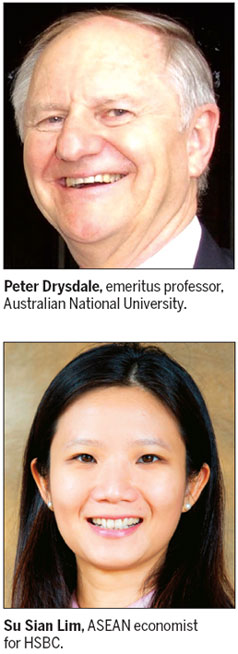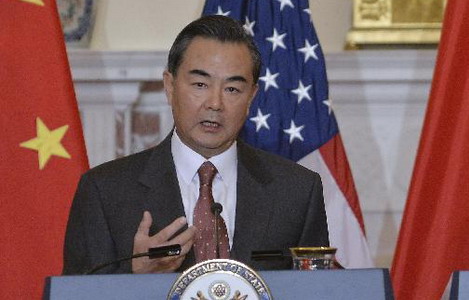US shift sends Indonesia reeling
Updated: 2013-09-20 17:31
By KARL WILSON in Sydney (China Daily)
|
||||||||
 |
|
A vendor attends to her vegetable stall at a market in Jakarta. Inflation in the country is rising faster than at any time since 2009 after a fuel price hike. AFP |
What a difference a year can make.
As far as emerging economies go, Indonesia was on a roll 12 months ago.
The economy was growing at a respectable 6 percent plus, demand for Indonesia's natural resources was strong, foreign investment was up and the new middle class ignited a massive consumer boom.
Today, things look rather different. There is a growing perception, not only in emerging Asia but in emerging economies in general, that the US Federal Reserve will start cutting back on its stimulus program as early as this month.
Already markets are spooked as foreign investors take their gains and head back to Europe and North America.
With the possibility that US interest rates will rise from virtually zero and as the economy starts to show new signs of life, emerging markets, especially in Asia, are starting to look less attractive.
Of all the countries in the Association of Southeast Asian Nations (ASEAN), Indonesia is suffering the most. The rupiah has lost around 12 percent of its value against the US dollar so far this year, compared to 8 percent for the Malaysian ringgit and 5 percent for the Thai baht.
A record current account deficit last quarter and worse-than-estimated economic growth and inflation data have led to a stock market slump and helped push the rupiah to its weakest level since 2009.

On Aug 29, Bank Indonesia (BI), in an unscheduled move, raised its benchmark interest rate by half a percentage point to try and shore up the rupiah.
The rate was increased from 6.5 percent to 7 percent. At the same time, BI extended a bilateral swap deal with the Bank of Japan valued at $12 billion that will allow the two to borrow from each other's foreign exchange reserves.
"What they (BI) can do now is to limit the collateral damage from the potential US policy shift," Wellian Wiranto, a Singapore-based investment strategist at the wealth management unit of Barclays, told Bloomberg.
"The Fed's previously abundant fountain of liquidity is turning into a black hole pulling everything in. BI can only try to anchor things as much as they can."
Manufacturing activity contracted sharply in Indonesia in August and the workforce declined, according to HSBC Markit purchasing managers' index, which fell to a 15-month low.
Economic growth has been slowing, dipping below 6 percent in the June quarter for the first time since 2010, according to Bloomberg.
Indonesian President Susilo Bambang Yudhoyono in June raised domestic fuel prices for the first time since 2008 to cut subsidy costs. The inflation rate may climb to between 9 percent and 9.8 percent by the end of 2013, according to BI.
Vaninder Singh and Sanjay Mathur, analysts with RBS, said in a note the recent rate cuts should be seen as a "temporary measure".
"More will need to be done to bring down the current account deficit to a more sustainable level," they said.
"The swap line is likely to help, however, it is important to note that swap lines are activated only under extreme events activation signals desperation."
The main issue driving Indonesia's trade deficit continues to be the weak commodities cycle, considering that a majority of Indonesian exports are commodities.
RBS expects the 2013 current account deficit to exceed 3.3 percent of GDP, compared to 2.7 percent in 2012.
Peter Drysdale, emeritus professor of economics at the Australian National University in Canberra, said that emerging economies, including those in Asia, have benefited from the rush of cheap capital from the old industrial world, where quantitative easing policies have generated vast sums into markets with the prospect of a positive rate of return.
"During the global financial crisis, Indonesia, China, India and Australia became the darlings of international capital markets," Drysdale said in an article on the East Asia Forum website.
"With the growing signs of turnabout in the United States, and the early harbingers of recovery in Europe, there are already pressures on emerging economies as capital flight back the other way begins to anticipate a major shift in the short-to-medium term structure of world growth," he said.
The economies most affected by tightening in their capital markets are those with economic weakness to begin with, he added.
"While Indonesia appears to have been doing much better, with solid real growth over 6 percent in recent years, the aphorism that 'good times beget bad policy outcomes' has come to have resonance in the country and there are worries about a retreat to protection and investment nationalism, especially in the presidential election cycle coming up to April 2014," Drysdale said.
A report by Nomura Global Research recently said financing Indonesia's current account deficit will be "tricky".
While foreign direct investment (FDI) inflows appear to be strong for now, there is a risk of "easing given political uncertainties" ahead of next year's elections and a shift to more "inward-looking policies".
The report said: "Even then, FDI is not enough to fully offset the current account deficit, leaving portfolio inflows as an important support for the balance of payments.
"There is now potential for the withdrawal of global liquidity due to a US Fed exit from loose monetary policies, which could leave Indonesia's balance of payments vulnerable."
Su Sian Lim, ASEAN economist for HSBC, says the Indonesian government and central bank have rolled out a "bevy of measures" to narrow the current account deficit and deal with the weakening currency.
"These are all steps in the right direction, but it will be months before they take effect," Lim says.
Among some of the measures announced by the government in August was a revision of the Negative Investment List, which spells out which sectors are wholly or partially closed to private foreign and/or domestic investment.
Strategic infrastructure projects will be sped up. There will also be tax holidays and incentives for firms to increase research and development, and for sectors that are labor intensive and export at least 30 percent of their output, such as textiles.
"That latter measure appeared more targeted at keeping Indonesians employed and maintaining their purchasing power," Lim says.
"The government also pledged to maintain provincial minimum wages in accordance with decent living needs. In an effort to tame inflation, the government added that it would eliminate limits on the volume of certain food imports, including beef."
Lim says the measures from both the government and central bank are well-intentioned, but does not believe that they will be sufficient in restoring market confidence in Indonesia's external payments position.
"While we agree with the government's view that the 3rd and 4th quarter current account deficits will narrow, it will not owe to the slew of measures rolled out last month, some of which will be relatively ineffectual, or will take a long time to bear fruit," she says.
karlwilson@chinadailyapac.com
(China Daily USA 09/20/2013 page19)

 iPhone 5s, iPhone 5c hit Chinese market
iPhone 5s, iPhone 5c hit Chinese market
 China to play 'constructive' role on Syria: FM
China to play 'constructive' role on Syria: FM
 iPhone 5s, iPhone 5c hit Chinese market
iPhone 5s, iPhone 5c hit Chinese market
 Faces of Tibet
Faces of Tibet
 Full moon across China
Full moon across China
 Wearable technology, the new game-changer
Wearable technology, the new game-changer
 Tapestry of Chinese culture and a Harvard teen's feeling
Tapestry of Chinese culture and a Harvard teen's feeling
 A simple but pure festival tradition
A simple but pure festival tradition
Most Viewed
Editor's Picks

|

|

|

|

|

|
Today's Top News
UN lauds China on food waste efforts
Chinese firms face trust deficit
13 injured in Chicago park shooting
Wang and Kerry meet in DC
Belgian zoo owner set to host Chinese pandas
Trending news across China
Fast-track process sees more NGOs
Beijing sends out positive smoke signals
US Weekly

|

|





